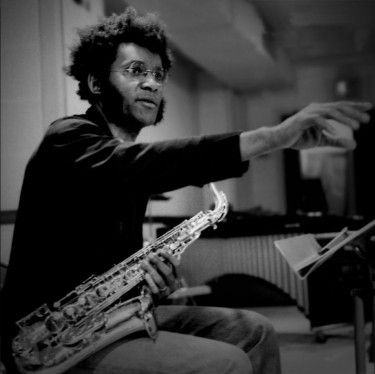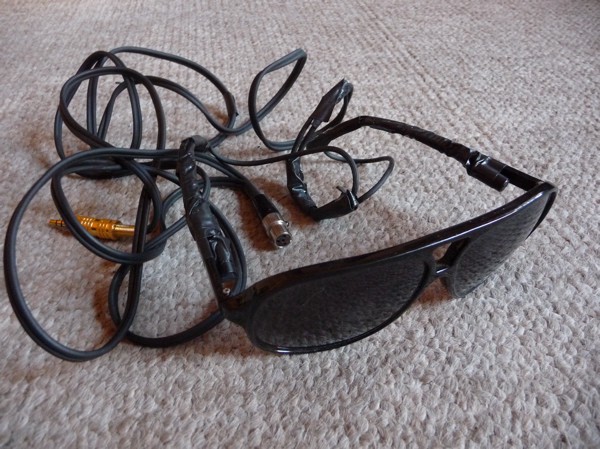The Awesome Treasures of Anthony Braxton's Music Club
by Seth Colter Walls

A series on the stuff that delighted us on the Internet this year.
There was something atypical and fun in Monday’s New York Times: a review of a concert that happened over the weekend in… Washington, D.C. Staff critic Acela-hopping to the latest jam at the Kennedy Center is not common, as Times critics have all they can cover here in town, usually.
But the reason for last weekend’s exception was plenty good, as recent MacArthur Award winning pianist Jason Moran had invited the great (and also MacArthur-winning) avant-music legend Anthony Braxton to present a band that included Braxton’s former student, the guitarist (and Awl favorite) Mary Halvorson.
Take us there, Ben Ratliff!
Why not Braxton at the Kennedy Center? Abstraction at the institution! Anarchist on the Potomac! Also, and more seriously, music without much practical connection to swing rhythm and the blues, presented under the banner of jazz. Many knew in a general sense what they were coming for. Mr. Braxton, 67, is an American musical force with hundreds of records. But the Kennedy Center is a subscriber-based institution, patronized partly by those who might not follow jazz beyond the institution’s mailings. And so, by Minute 5 or 6 of a 75-minute performance, the grumbling began, robust and aggrieved, from those who thought they were going to hear something similar to what they knew.
“What does it mean?” I heard it behind me. Forceful exhaling too. Soon walkouts. All good and healthy.
Ratliff is correct that a concert strong enough to produce walkouts is a good and healthy thing. (It’s worth noting that even New York has its more upsettable concert-goers, as I saw recently during a blistering Wozzeck conducted by Esa-Pekka Salonen at Avery Fisher Hall.) And yet there was, as it happens, a perfectly good answer to the question of “what does it mean,” and it comes from Braxton himself: “I know I’m an African-American, and I know I play the saxophone, but I’m not a jazz musician. I’m not a classical musician, either. My music is like my life: It’s in between these areas.”
This comes from the bio on Braxton’s own website, which is its own good and healthy thing — helping as it does to make people aware of the meaning of a work before they surprise-surprise bump into the new radical music as part of a subscribers’-folly ticket package. Because Braxton has gone the self-distribution route online, it is now easier than previously (as a practical matter) to get to know his music. If you are bored of your Internet, perhaps give Anthony’s a look — or even join. Even at the price-point of zero dollars, it boasts many treasures.
His “Tri-Centric Foundation” (the name comes from a Braxton’s own multi-hundred page philosophical-music text) was established a couple years back, in order to revamp a prior self-distributed label that had shuttered.
Now, instead of pressing costly CDs, most of Braxton’s new albums are just distributed as mp3s (or FLAC files, if you’re like that) to subscribers.
This is a worthy and notable development, if only because it helps fans to keep up with Braxton’s many projects and performances (over nearly half a century) without carting a bunch of physical media everywhere one winds up living, the way one lives now. This month, subscribers have heard a recording by a current Braxton band — “Echo Echo Mirror House” — in which players, aside from their instruments, play Braxton’s old pieces loaded onto iPods.
We also, just this morning, received a nice bonus holiday gift: a long-lost solo performance by Braxton at Carnegie Hall’s recital space, now dubbed the Weill Recital Hall. (If you subscribe this month, you can still get both of these albums as your “monthly” free download.)
That performance was previously undocumented. After the 38-minute tape was discovered as part of a bootlegger’s trove earlier this year, the music was sent to Braxton’s foundation, and then prepared for its released today (along with the image below of the bootlegger’s very hip sunglasses-and-microphones setup).

Photo: Kyoko Kitamura
It’s a real treat, this solo Carnegie performance from 1972! I’m still getting used to how bluesily expressive the first improvisation and the run through “Lush Life” sound.
There are, to be sure, more experimental textures involved. According to the Tri-Centric Foundation, the only previous record of this Braxton date appeared in a brief Times listing, though the concert itself was not reviewed. However, just a few weeks before the Carnegie performance, the paper’s John S. Wilson wrote on another early Braxton performance at Town Hall; he called Braxton “very capable as a jazz alto-saxophonist” in the context of Chick Corea’s then-current band, and also handy with the theme of “All the Things You Are” — at least before the musician indulged what Wilson termed “the ridiculousness of gasping shrieks and squeals.”
And so we find that the question of “what does it mean” has long been with us. That Braxton can still force 48 walkouts at the Kennedy Center on a single night was of some interest to Washington City Paper’s Michael J. West: “There’s a lot to take away from this,” West wrote. “For one, that Braxton after almost 50 years still has the power to provoke. For another, that Washington D.C. in the Obama era remains a conservative place.”
And so the work continues. Of the 12 more-contemporary recordings that the Tri-Centric Foundation released this year to monthly subscribers, two count (to my mind) as very important additions to the Braxton discography: a choral album and a large improvising-orchestra session, both recorded in 2011.
Here is a clip of the wonderfully loopy choral piece:
And here’s what Braxton is up to with a big band these days (one that also includes Awl favorite Steve Lehman):
Let us take a moment to appreciate the fact that many musicians who try to run monthly subscription services often run out of monthly ideas. For example: there was a fun period, running from the late 90s up until about 2002 or so, when it was very much worth it to pay a flat fee in order to hear how Prince was entertaining himself in the studio every few weeks. Then his storied songwriting productivity sorta fell off, and you spent your time in the Prince-internet figuring out how to play Windows Media files loaded with DRM that had been stashed in a bad video game version of Clue. (Oh I see: the Purple One hid the Jimi Hendrix-style guitar freakout in the study underneath the desk with a candle on it.) At this point, it was safe to “unsubscribe” from his service and just wait for an album every other year (until those stopped coming, also).
By way of contrast, it is fair to say that one thing Anthony Braxton has never been out of is ideas — either on paper or live in performance — making him exactly the sort of artist that merits month-to-month attention. Ever since Braxton joined up with the Association for the Advancement of Creative Musicians in their late-60s, South Side Chicago firmament, the multi-reed-playing composer has been a force for ingenuity. He expanded the language of saxophone in jazz music, played with giants of international improvisation like Derek Bailey and more canonized folk such as the late Dave Brubeck, and has written a cycle of tremendous (and idiosyncratic) operas. And for the last couple years, he’s had this really exciting website.
Even if you are not ready to spend $7.99 a month to get whatever new album Braxton approves for release (plus a 30% discount on all back-catalog downloads), there are, at any one time, 13 different bootlegs you can download for free over there. (Every time the foundation makes a new batch of 13 downloads available for “friendly experiencers,” the previous set of 13 bootlegs goes behind the subscriber paywall.)
The current range of 13 official bootlegs finds Braxton in many interesting ensembles dating from the 70s and 80s. Here’s a hot quintet performance with Kenny Wheeler on trumpet, Dave Holland on bass, Richard Teitelbaum on syntheszier and Barry Altschul on drums, in which the ensemble has a wonderfully un-busy way with the jagged theme of Braxton’s “Composition No. 23G.” Then the leader hops in, moving at light-speed, with added pieces of synth shrapnel bits adding to the fun in the background. Even farther out is this 1982 trio date with free improv guitarist Derek Bailey and the trombonist-composer George Lewis. And one of Braxton’s fine mid-80s quartets with Marilyn Crispell on piano — the site of some of Braxton’s most recognizably “jazz”-y work — is represented on this free-to-have recording.
If you listen to those three bootlegs and want to hear more: oh boy, is there ever more. Most important, at least in terms of “music history as it stands so far,” are the nine LPs that Braxton cut for the insanely well-funded Arista label in the 1970s. They were finally collected on CD for this box set, which is money very well spent — though it is an all-at-once sort of investment.
So perhaps you’d just like to be surprised by the monthly Braxton download, thereby keeping very up to the minute with one of the world’s most surprising musicians. As for last weekend’s performance down in Washington, there’s every reason to hope it’ll be one of the foundation’s albums released in 2013. (That is unless Jason Moran’s label pulls some kind of proprietary nonsense on us. So, uh: Blue Note, please don’t do that.) The Washington Post, which devoted less than half as much space to Braxton’s performance as The Times, cited with approval the “animalistic roars, delicate filigrees, sudden driving attacks, breathy fragments of melody, amplified scratches.” Maybe now that Braxton’s foundation has an organized way of preserving these performances for posterity, even last weekend’s mutterers and early-leavers will have some future opportunity to come around to those, and other, sounds.
Previously in series: Not OK Cupid
Seth Colter Walls is a culture critic and reporter for Slate, NewYorker.com, The Village Voice, Washington Post, Capital New York, and lots of other places.
